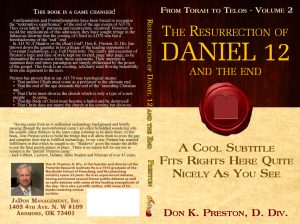The Resurrection at the Sound of the Trumpet #3 (Matthew 24 and the Resurrection)
In our study of the Resurrection in Matthew 24 (The Olivet Discourse) we are demonstrating that when Jesus predicted the gathering of the elect at the sound of the Great Trumpet, he was in fact predicting the end time resurrection. When this is acknowledged, this demands that the resurrection was in AD 70!
I Corinthians 15:51-52
Paul spoke of the resurrection “in a moment, in the twinkling of an eye, at the last trumpet: for the trumpet will sound, and the dead will be raised incorruptible…” (v.52). This is clearly the resurrection at the sound of the trumpet.
Paul says “THE TRUMPET.” He obviously was alluding to some known teaching about “the trumpet.” Were he introducing a new concept about the sounding of a trumpet would he not have to delineate between the teaching ALREADY KNOWN and the new teaching he was introducing? So, what was the previous teaching about the sounding of “the trumpet” for the gathering of the dead? It is Matthew 24 and Isaiah 27:13!
Consider the direct parallels between the Olivet Discourse and 1 Corinthians 15:
Both Matthew 24 and 1 Corinthians 15 are dealing with the “Hope of Israel.”
Both anticipated the end of the age.
Both spoke of the parousia of Christ.
Both predicted the gathering of the elect.
Both predicted the resurrection– be sure to read the previous article on Isaiah 27:13 and how Jesus cited it in Matthew 24:31.
Both predicted fulfillment in the first century: (this generation will be no means pass until all these things are fulfilled” – 24:34)– “I tell you a mystery, we will not all sleep”- 1 Corinthians 15:51.
Remember that each of these tenets in the parallels is taken from the “section” of Matthew 24 that the Amillennialists and Postmillennialists agree refers to the events leading up to and consummating in the Lord’s coming in the judgment of Jerusalem in AD 70. So, if the parallels are legitimate, and I fail to see how that can be denied, this virtually demands that 1 Corinthians 15 was fulfilled in AD 70. This is of course driven home by the fact that 1 Corinthians 15 would be the fulfillment of Daniel 12, which set the resurrection at the time when “the power of the holy people is completely shattered” (Daniel 12: 1-7). See my book, The Resurrection of Daniel 12:2: Fulfilled or Future?

Now if it be admitted that the trumpet of Matthew 24 cannot refer to the end of time and creation, and yet it is insisted I Corinthians 15:52 does refer to such, it must clearly be shown why the trumpet of Corinthians is not the same as that in Matthew when Paul simply refers to “the trumpet” and the only sounding of the trumpet mentioned in the New Testament before Corinthians is Matthew 24. Did Paul not say that he got his gospel from Jesus? One must explain why Matthew is apocalyptic and spiritual yet Corinthians is literal/audible; even though I Corinthians is patently drawing upon earlier teaching about “the trumpet.”
The apostle also said it was “THE LAST TRUMPET.” There would be no more eschatoloigcal trumpets sounded after the “last trumpet”! One is forced to think of Revelation and the sounding of the 7 trumpets. More on that in our next installment.
Observe that Paul emphatically tells us that the resurrection at the sounding of the last trumpet would be the fulfillment of the prediction found in Isaiah 25:8; the very context of the sounding of the great trumpet of God for the gathering of the elect from their “graves,” separated from God in Isaiah 27. Paul says the resurrection of which he speaks was to be when the strength of sin, i.e., “the law”; the law he called the ministration of death and a covering over the people (cf. Isa.25:7, 2 Corinthians 3; the law that condemned and cursed- Gal. 3:10-13; the law of bondage- Galatians 4:22f, was destroyed).
When did Paul say the last trumpet– the resurrection at the sounding of the trumpet- was to sound? In verse 51 he says, “we shall not all sleep, but we shall all be changed.” This is nothing less than a positive assertion that, “This generation shall not pass till all these things be fulfilled.”
In I Corinthians 15 we find then the idea of Christ’s coming, judgment, the sounding of the trumpet, and the gathering of the elect, i.e., the resurrection; and his assertion it would be in that generation.
In our next article on the resurrection at the sound of the trumpet, we will show the perfect harmony between 1 Corinthians 15, Thessalonians and the Olivet Discourse. Stay tuned!
Source: Don K. Preston
